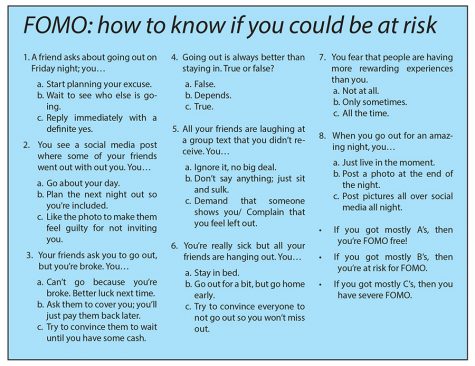Students test their discipline
May 9, 2018
Participating in the FOMO experiment: Brianna’s reflection
FOMO (fear of missing out) is an epidemic that impacts millions.
As further described by Dr. Andrew Przybylski, a psychologist at the University of Essex, FOMO is “the desire to stay continually connected with what others are doing.”
From 2013 to 2015, there was a 51 percent increase in the number of people regularly visiting/logging on to social media and it seems safe to assume that it is still increasing.
Jeddy Genrwot, a pc tech magazine reporter, stated, “More than half of social networkers are experiencing FOMO.” With the increase of social media use and soon after the increase of FOMO, people have automatically linked the two together.
According to a story on the ABC News website, “There is a very strong positive correlation between the hours spent on digital technology and higher stress and depression.” FOMO can be indirectly linked to phone use through social media, so psychologists have also linked FOMO to depression and anxiety.
To create a more personal assessment on FOMO and test some of the information we found, Faith Holliday, Eyrie staff member, and I participated in an experiment.
The experiment was simple: no phone use for three days (Thursday, April 19 through Saturday, April 21). We were at liberty to check our phones twice a day at most to contact parents if necessary and choose if our phones were muted or not.
After taking part in the experiment, I concluded that, despite all the explanations saying people fear missing out on what others are doing, not everyone experiences FOMO this way.
Throughout the days with my phone muted, it wasn’t hard to stay off my phone. I don’t usually use social media to skim through what everyone is posting so I wasn’t missing out on that.
However, when my phone was unmuted and I could hear all the notifications, I couldn’t help wondering who was texting me and what they were saying. I gave in a couple of times just to see what was happening, but was able to refrain from responding further.
I did not react to disconnecting the way I assumed I would have based on my research, but I was still influenced by FOMO enough to break the rules of the experiment.
Participating in the FOMO experiment: Faith’s reflection
I participated in a FOMO experiment with Brianna Calderon, another Eyrie staff member.
Calderon and I had very different experiences while participating in this experiment. While Calderon does not experience FOMO, I deal with it everyday.
Day one of the experiment was the most difficult day. I kept reaching for my phone when I knew I shouldn’t, so I just ended up turning it off.
During lunch, all of my friends were using their phones while I just sat there. I felt left out of their conversations and I ended up staying quiet most of the period.
When I went home after school, the struggle truly began. I became extremely anxious and restless without being able to check my social media.
That same night, I broke down and texted one of my friends. The conversation was short but it relieved a lot of my stress.
Day two was surprisingly less painful. Most of my friends and family members knew about the experiment, and some even played along for a while.
Talking with others face to face became more necessary, therefore, I became more comfortable with it. I felt more present than I ever had before.
Instead of my head being in my phone all of the time, I noticed small things, such as a sign that I’ve never read at school or the way my mom’s face crinkles when she smiles.
Part of using social media is keeping up with all of the latest celebrity drama and news. Being separated from this for a few days felt freeing and relaxing.
Day three was a Saturday, and I didn’t have any plans. Most of my day was spent sleeping and pacing to avoid the temptation of using my phone.
Just hours before the experiment was over, I gave in and signed into all of my social media accounts. Some of my friends noticed this and scolded me for doing so.
Part of my evening routine is checking all of my social media, and not being able to do so for three days was painful.
Overall, my experience was mixed. Although I felt relieved of some pressure, the experience also added stress to my life.
I will probably never do this again, but the experience helped me notice the positive and negative effects of social media.

